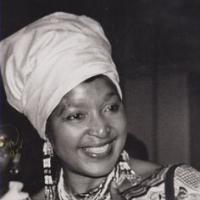South African anti-apartheid campaigner, politician, and humanitarian Winnie Madikizela-Mandela. She was born on September 26, 1936, in Bizana, a tiny rural community in South Africa’s Eastern Cape. Winnie was raised in a traditional Xhosa family and was the daughter of a rural teacher. She studied social work at Johannesburg’s prominent Jan Hofmeyr School of Social Work, becoming licensed as a social worker in 1955.
Zenani and Zindziswa, Winnie and Nelson Mandela’s daughters, were born in 1958. Winnie continued to be an active member of the anti-apartheid movement despite her husband’s frequent absences brought on by his political activism. Nelson was given a life sentence in prison in 1969, and Winnie was the target of extensive monitoring and intimidation by the apartheid government.
During her husband’s incarceration, Winnie became a central figure in the fight against apartheid, using her prominence as Nelson’s wife to draw attention to the cause. She was arrested several times for her political activities and spent periods of time in prison, where she was subjected to torture and abuse. Despite the hardships she faced, Winnie remained steadfast in her commitment to the cause of freedom and equality in South Africa.
Winnie’s activism was not limited to South Africa, and she became a figure of international prominence, speaking at anti-apartheid rallies and conferences around the world. Her bravery and determination inspired countless people, and she was widely regarded as a symbol of the anti-apartheid movement.
In 1991, Nelson was finally released from prison, and Winnie’s reputation and popularity continued to grow. The couple was reunified, but their marriage was strained by the years they had spent apart and the challenges they faced in trying to build a new South Africa.
In the 1990s, charges of corruption, power abuse, and human rights crimes against Winnie brought her participation in the anti-apartheid campaign into question. A number of her bodyguards referred to as the Mandela United Football Club were charged with the kidnapping and murder of Stompie Moeketsi, a 14-year-old boy who was thought to be an informant, in 1991. After being found guilty of kidnapping and assault in 1991, Winnie was given a six-year jail sentence; however, this was later reduced on appeal to a fine and a two-year suspended sentence.
Despite these controversies, Winnie remained a prominent political figure and a powerful voice in South Africa. In 1994, she was elected as a member of parliament, and she continued to be an outspoken critic of the new government and a champion for the rights of women and the poor. She also established several charitable organizations, including the Winnie Mandela Children’s Foundation, which provided support to disadvantaged children and families in South Africa.
In her later years, Winnie experienced a variety of health issues after receiving a diabetes diagnosis in the late 1990s. She still remained a vocal and noticeable presence in South African politics, advocating for social justice and human rights until her death on April 2, 2018.
Her tireless work, bravery, and steadfast dedication to the causes of freedom and equality have left Winnie Mandela with a difficult legacy. Winnie was greatly admired by millions of people all around the world as a symbol of resistance and tenacity in the face of injustice, notwithstanding the controversy that surrounded her. She made a significant contribution to the struggle against apartheid, spoke up for the rights of women and the underprivileged, and worked tirelessly to promote social justice and human dignity.

